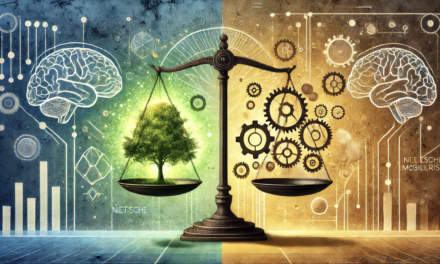Introduction
As we navigate the complexities of the Anthropocene, the concept of progress requires a profound reassessment. Traditional benchmarks—technological advancements, economic growth, and efficiency improvements—are no longer sufficient on their own. Instead, progress must be redefined to include the sustainability of our planet and the ethical implications of our innovations.
The New Definition of Progress
Progress, in the traditional sense, suggests a linear path toward a set of predefined goals. However, in the Anthropocene, this concept must evolve. By viewing progress as an unfolding process—a continuous adaptation to changing conditions and new information—we can develop a more sustainable and responsive approach to innovation and growth.
Adaptive Progress
Adaptive progress means that our strategies, policies, and technologies must evolve as we encounter new challenges and acquire new information. This perspective aligns with Bayesian principles, where beliefs and decisions are updated based on incoming data and contextual shifts. It’s not merely about reacting to changes but anticipating and preparing for future needs and conditions.
Contextual Sensitivity
Progress must also be context-sensitive, reflecting the specific environmental, cultural, and economic conditions of different regions. This approach ensures that solutions are not only effective but also sustainable and equitable, tailored to the unique challenges and opportunities of each context.
Policy Making
In governance, the concept of unfolding suggests that laws and regulations should be dynamic, capable of adjusting as societal values, technological capabilities, and environmental conditions evolve. This fluid approach to policy-making requires a framework that embraces uncertainty and probability, hallmarks of Bayesian thinking.
Innovation Practices
For technology and business, incorporating the idea of unfolding into innovation practices emphasizes the development of products and services that anticipate and adapt to future conditions. This predictive approach to innovation, inspired by Bayesian prediction, can lead to more sustainable and forward-thinking outcomes.
Ethical and Philosophical Dimensions
The unfolding nature of progress necessitates a continuous reassessment of ethical standards. As our understanding of the world and its complexities grows, so too must our ethical frameworks evolve. This dynamic approach to ethics helps ensure that our actions remain aligned with changing global values and emerging scientific insights.
Conclusion
Redefining progress as an unfolding process transforms our approach to meeting the challenges of the Anthropocene. It encourages us to embrace adaptation, anticipate future developments, and respond dynamically to the world’s changing needs. By fostering a culture of continuous learning and responsiveness, we can ensure that progress in the 21st century is sustainable, ethical, and inclusive.
Terry Cooke-Davies
2nd May 2024
Special thanks to the AI assistance provided by Perplexity AI, and by ChatGPT (4) from OpenAI in shaping this article.

Link to Series Home Page
Rethinking and Reimagining Progress: Exploring the Convergence of Physical, Biological, and Cultural Evolution

Link to Article 2 of 3
Unveiling Unity: The Interconnected Evolution of the Cosmos, Life, and Human Culture

Link to Article 3 of 3
Integrating Consciousness, Non-duality, and Self-Identity into a New Paradigm of Progress






